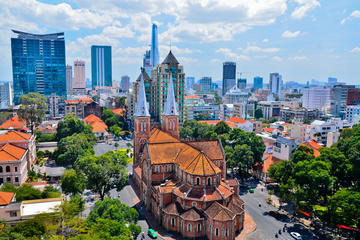In some people’s views, they still associate Vietnam with the war that happened in 1954 to 1975. This time period was when the U.S. was in war against the Vietnam to stop the spread of communism during the Cold War. In the article, “The legacy of agent orange: empirical evidence from central Vietnam,” Michael Palmer talked about the chemical Agent Orange (AO) that was used to destroy the plants that covered the enemy troops and crops for food production during this war. The environmental and health effects of this chemical is still unknown, but there are suggestive evidence that there are some negative health problems from this chemical such as spina bifida, prostate cancer, and cerebral palsy in children of fathers who went to the Vietnam war. Because the U.S. was the one who used AO without knowing the effects, the U.S. government has given some compensation for the U.S. veterans, but does not compensate the victims in Vietnam. The government wanted to avoid the fact that they have committed a war crime, so they cover up the truth.
Because of the Vietnam War, some people are still angry at the Vietnamese people that they do not want to tour Vietnam and would rather tour in a different country. However, there are some people who still want to tour Vietnam. Those tourists who went to Vietnam had experienced some conversations where the Vietnamese would lie to them. This was seen in the article “Excepts from Andrew Rowan’s Manuscript” where Rowan said that the “locals [are] not being straightforward or even lying” to foreigners. The locals in Vietnam would lie to foreigners since it has become part of their culture. They see the lie as “‘bending the truth’” since “white lies are-more-often-than-not perfectly acceptable” (Rowan). This conveys to the foreigners that the Vietnamese are not friendly and will cheat on them.
For my group’s research project, the untruths in the Vietnam case can be applied here if we teach adolescents about culture and heritage in an untruthful and biased way. The adolescents will not know if the information is correct or incorrect, so they will absorb what they have learned and remember it. If they continue to learn about the biased or exaggerated version and not about the truthful and unbiased version of their Asian culture and heritage, they would end up passing on the untruthful version to their future generations. Then, this would seem like our program is promoting untruths to adolescents.
Question: In other countries, what untruths are promoted to make their brand better?
Works Cited
https://cache-graphicslib.viator.com/graphicslib/thumbs360x240/5060/SITours/ho-chi-minh-city-discovery-small-group-adventure-tour-in-ho-chi-minh-city-340889.jpg
Palmer, Michael G. "The legacy of agent orange: empirical evidence from central Vietnam." Social Science & Medicine60.5 (2005): 1061-1070.
Rowan, Andrew. "Excerpts from Andrew Rowan's Manuscript."

No comments:
Post a Comment